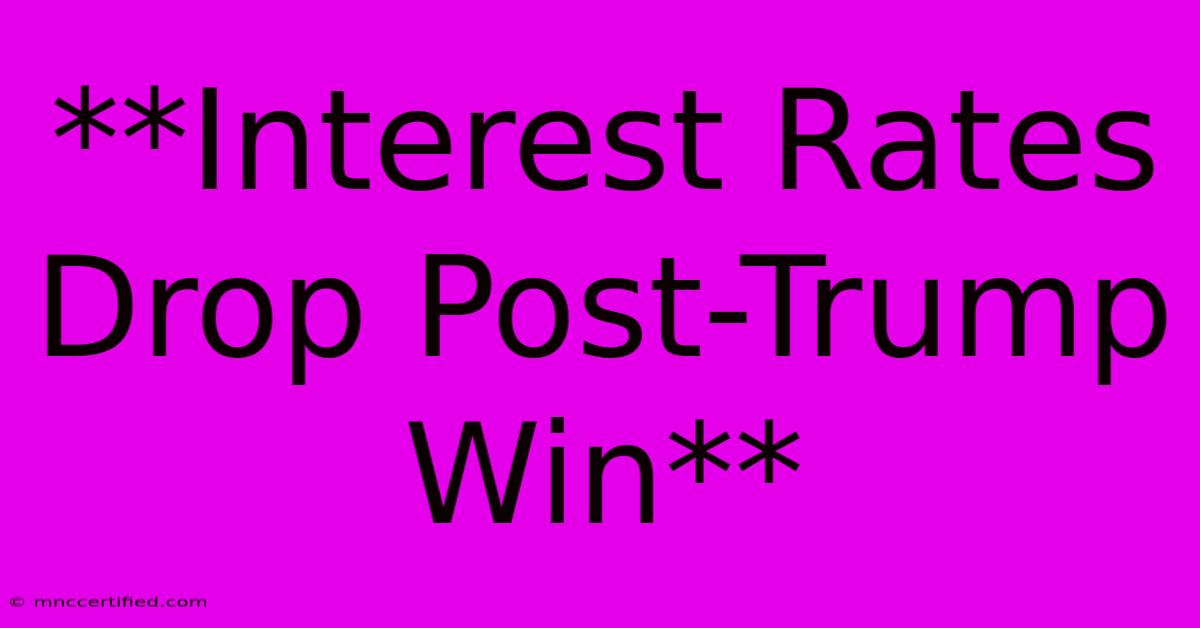**Interest Rates Drop Post-Trump Win**

Table of Contents
Interest Rates Drop Post-Trump Win: What Does It Mean for You?
The 2016 US presidential election was a tumultuous affair, with the outcome sending shockwaves through global markets. One of the most immediate reactions was a sharp decline in interest rates, a trend that continued in the months following Donald Trump's victory. This unexpected shift raised questions for investors and everyday citizens alike: why did interest rates drop, and what does it mean for the future?
Why Did Interest Rates Drop?
The decline in interest rates post-Trump win was driven by several factors:
- Uncertainty and Risk Aversion: The election result, considered an upset by many, created an environment of uncertainty and risk aversion. Investors, unsure of Trump's economic policies and their impact, sought the safety of government bonds, leading to increased demand and a subsequent decrease in interest rates.
- Expectations of Stimulus: Trump's campaign promises included tax cuts and increased infrastructure spending, policies that could potentially boost economic growth. This anticipation of stimulus led to expectations of higher inflation, which in turn put downward pressure on interest rates.
- Global Economic Conditions: The US economy was already showing signs of sluggish growth at the time of the election. This, coupled with global economic uncertainties, further contributed to investors seeking safe haven assets, driving down interest rates.
What Does It Mean for You?
The drop in interest rates has both positive and negative implications for individuals and businesses:
Positive Implications:
- Lower Borrowing Costs: Lower interest rates make it cheaper to borrow money, benefiting consumers and businesses looking to take out loans for mortgages, car purchases, or business expansion.
- Increased Home Buying Activity: Lower mortgage rates can stimulate demand in the housing market, making homes more affordable and driving up prices.
- Stronger Stock Market: Lower interest rates can encourage investors to shift their funds from bonds to stocks, potentially boosting stock market performance.
Negative Implications:
- Reduced Savings Returns: Lower interest rates mean lower returns on savings accounts and certificates of deposit (CDs), potentially impacting individuals seeking to grow their savings.
- Potential for Inflation: The expectation of higher inflation, driven by potential economic stimulus, could erode the value of savings and lead to higher prices for goods and services.
Looking Ahead
The future trajectory of interest rates remains uncertain. While the initial decline was driven by immediate market reactions, long-term trends will depend on the effectiveness of Trump's policies, global economic conditions, and the Federal Reserve's actions.
Staying informed and adjusting financial strategies in response to changing interest rate environments is crucial for individuals and businesses alike. This includes:
- Monitoring economic news and market trends: Stay informed about the factors influencing interest rate movements.
- Reviewing personal and business finances: Assess your current financial situation and consider adjusting investment strategies or borrowing plans based on interest rate changes.
- Seeking expert advice: Consult with financial advisors to understand the implications of interest rate fluctuations and create a plan that aligns with your financial goals.
By staying proactive and informed, you can navigate the evolving interest rate landscape and make informed decisions to protect and grow your wealth.

Thank you for visiting our website wich cover about **Interest Rates Drop Post-Trump Win**. We hope the information provided has been useful to you. Feel free to contact us if you have any questions or need further assistance. See you next time and dont miss to bookmark.
Featured Posts
-
Ps 5 Pro Top 7 Games With Enhanced Graphics
Nov 08, 2024
-
Texas Motorcycle Insurance Requirements
Nov 08, 2024
-
Israel Brings Soccer Fans Home From Amsterdam
Nov 08, 2024
-
Nhs Neurologist Supports Hamas Armed Struggle
Nov 08, 2024
-
Reds Trio On Track For Comeback
Nov 08, 2024